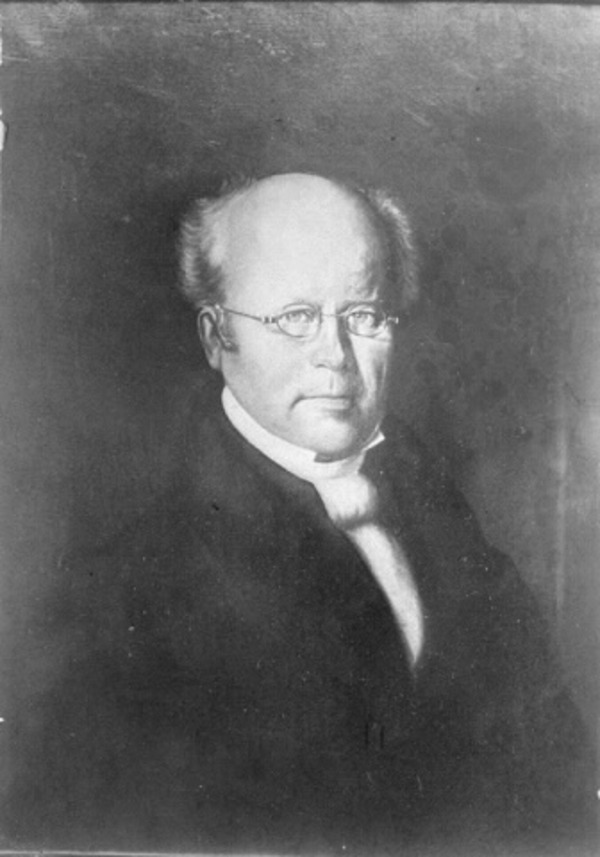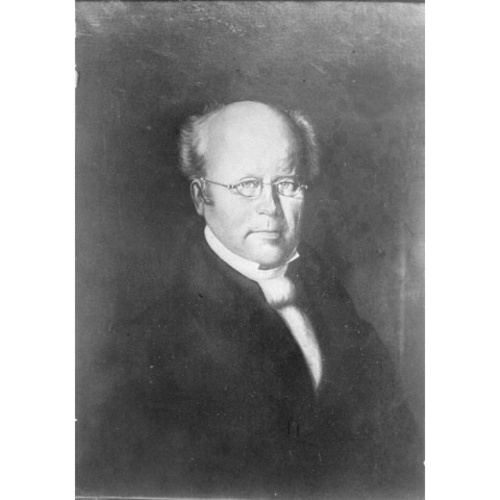POWELL, GRANT, physician, surgeon, militia officer, office holder, jp, and judge; baptized 30 May 1779 in Norwich, England, third son of William Dummer Powell* and Anne Murray; m. 1 May 1805 Elizabeth Bleeker (Bleecker) of Albany, N.Y., and they had four sons and six daughters; d. 10 June 1838 in Toronto.
Grant Powell was educated in England and apprenticed to a surgeon in Norwich. At the end of his term, an aunt wrote in 1799, he “did not sufficiently understand his profession to be of any essential service” to his master and he was £80 in debt. This pattern of professional and financial incompetence was to mark his career. Family connections failed to get him a post with the British army and his father, a judge in Upper Canada, could find him nothing in the Canadas. Grant moved to the United States and tried to establish himself in a number of places before settling into a medical practice in Stillwater, N.Y., by April 1803. It was not a success and he sank deeply into debt. When he was 30, his mother noted that “he is now the only son who calls for advice or assistance.” His wife’s family refused to help him and his father again failed in efforts to find him a place. Plans to move to Albany and to York (Toronto), Upper Canada, fell through.
In 1810 he abandoned his practice and moved to Montreal, where the death of a local doctor (probably Charles Blake*) soon made an opening for him. Full of hope, and promising prudence, he began to practise and in March 1812 was appointed a medical examiner for the district of Montreal. On the outbreak of war in June, he left Montreal and later that summer, probably on the recommendation of Major-General Isaac Brock*, was appointed acting surgeon to the Provincial Marine at York. During the first American capture of York, in April 1813, his house was plundered and during the second, in July, he and John Strachan* acted as civilian spokesmen for the beleaguered town, from which the British had retreated. Powell remained acting surgeon throughout the winter but lost his post in the spring when, as a result of the Provincial Marine’s displacement by the Royal Navy, British medical officers arrived in Upper Canada. He served for the rest of the war as a surgeon in the Volunteer Incorporated Militia Battalion.
During the war his father was at last able to help him, securing for him in May 1813 an appointment as clerk of the House of Assembly, at an annual salary of £250. Powell also obtained positions on the bench: in April 1813 he had become official principal (judge) of the Court of Probate, in 1814 he was appointed a justice of the peace, and in 1818 he was made a district court judge. Over time he served on a number of boards, commissions, councils, and societies. By February 1818, according to his mother, he had “declined” practising medicine but maintained a connection with the profession as a member of the Medical Board of Upper Canada (1819–38) and the York hospital board (1821), and as a health officer for York and vicinity (1832–33). Powell’s interests were primarily official and political. In 1827 he left his post in the assembly to become clerk of the Legislative Council, an office he retained until his death. A tory, he supported the election in 1828 of John Beverley Robinson* and the candidacy in January 1830 of Sheriff William Botsford Jarvis*, who had married his niece.
As he reached the age of 40 in 1819, he seemed at last to be settled and he was optimistic about the future. A growing family nevertheless strained his resources and he never did learn to manage what money he had. In 1826 he suffered a heavy blow when the assembly refused to raise his salary. His father, who feared that he had “borrowed a loaf from the oven,” noted then that the payment of arrears on his half pay as a militia surgeon would come as a “sensible relief.” Powell continued to depend on his father, drawing in advance on his inheritance and looking to him for help for his children. It was, perhaps, a sense of failure and the constant worry about money which made him, in his 50s, a man of “intolerable, sarcastic, supercilious manners,” his mother informed her brother. Powell grew prickly and very conscious of his position; in 1837 he resigned from King’s College Council when he found his name listed below those of newly appointed members. At that time, too, he spoke critically of Lieutenant Governor Sir Francis Bond Head*, which action, his mother later wrote, “exposed him to neglect and incivility.” His death left his family in financial difficulties. His son William Dummer, supported by Chief Justice John Beverley Robinson, petitioned for the appointment as clerk of the Legislative Council and his widow asked for a pension, but neither request succeeded.
Academy of Medicine (Toronto), ms 137 (Proceedings of the Medical Board of Upper Canada, 1819–48). AO, MU 1532; MU 1537; RG 22, ser.94, 2: 208; ser.155. MTRL, W. D. Powell papers. Norfolk Record Office (Norwich, Eng.), Archdeacon’s transcript for Norwich, St Clements, reg. of baptisms, 30 May 1779. PAC, RG 4, B28, 47: 272–75; RG 5, A1: 19098–100, 70543, 108854–55; C1, 2, file 291; 6, file 603; RG 8, I(C ser.), 84: 221–22, 228–29, 248–49; 1168: 292; 1717: 65; RG 19, E5(a), 3745, claim 335; RG 68, General index, 1651–1841: 64, 74, 182, 219. Arthur papers (Sanderson), 1: 195–96. [Anne Murray] Powell, “Letters of Mrs. Wm. Dummer Powell, 1807–1821,” ed. Janet Carnochan, Niagara Hist. Soc., [Pub.], no.14 ([1906]): 1–40. Select British docs. of War of 1812 (Wood), 1: 397; 2: 190–93. Town of York, 1815-34 (Firth). U.C., House of Assembly, App. to the journal, 1839, 2, pt.ii: 844. Patriot (Toronto), 12 June 1838. Armstrong, Handbook of Upper Canadian chronology (1967). Chadwick, Ontarian families, 1: 32–34. Toronto directory, 1833–34, 1837. R. J. Burns, “The first elite of Toronto: an examination of the genesis, consolidation and duration of power in an emerging colonial society” (phd thesis, Univ. of Western Ont., London, 1974). Canniff, Medical profession in U.C., 559–62. W. G. Cosbie, The Toronto General Hospital, 1819–1965: a chronicle (Toronto, 1975). A history of Upper Canada College, 1829–1892; with contributions by old Upper Canada College boys, lists of head-boys, exhibitioners, university scholars and medallists, and a roll of the school, comp. George Dickson and G. M. Adam (Toronto, 1893), 52. W. R. Riddell, The life of William Dummer Powell, first judge at Detroit and fifth chief justice of Upper Canada (Lansing, Mich., 1924). Robertson’s landmarks of Toronto, 1: 188–89, 193; 3: 288. Scadding, Toronto of old (Armstrong; 1966). F. N. Walker, Sketches of old Toronto (Toronto, 1965).
Cite This Article
Geoffrey Bilson, “POWELL, GRANT,” in Dictionary of Canadian Biography, vol. 7, University of Toronto/Université Laval, 2003–, accessed December 30, 2025, https://www.biographi.ca/en/bio/powell_grant_7E.html.
The citation above shows the format for footnotes and endnotes according to the Chicago manual of style (16th edition). Information to be used in other citation formats:
| Permalink: | https://www.biographi.ca/en/bio/powell_grant_7E.html |
| Author of Article: | Geoffrey Bilson |
| Title of Article: | POWELL, GRANT |
| Publication Name: | Dictionary of Canadian Biography, vol. 7 |
| Publisher: | University of Toronto/Université Laval |
| Year of publication: | 1988 |
| Year of revision: | 1988 |
| Access Date: | December 30, 2025 |




